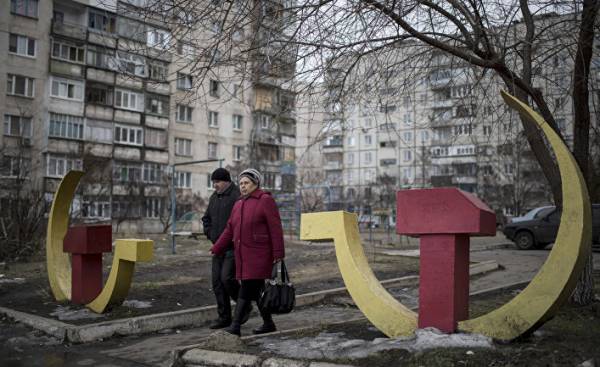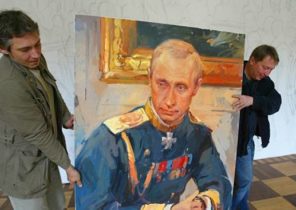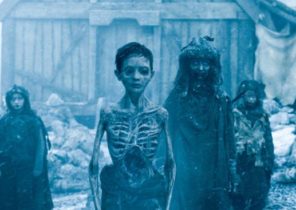
The war in Eastern Ukraine has divided families. Brothers are fighting against each other on opposite sides of the front. And yet people manage to overcome the split.
When the war begins, it is impossible to hide. It spreads like a dark cloud of smoke in the city. Like it or not, the cloud envelops. You need to take a stand, make a decision to stay or leave. A cloud of smoke affects everyone. Like it or not — suddenly found themselves with a black Gary face.
The war recedes, it becomes the point to which used. It seems that is what happened in Eastern Ukraine where war has lasted for more than three years. More than 10 thousand people were killed, two million fled the country. But many are still in the Donbass on both sides of the front — and then learn to coexist with each other, again to see the faces behind the smoke of war.
Mariupol, East Ukraine. A port city full of Ukrainian soldiers Outpost. Only 20 km away is the front line. After the war began in the spring of 2014 Mariupol for a short time belonged to the so-called Donetsk people’s Republic, in June of the same year, the Ukrainian army retook the city.
In Mariupol is now home to 450 thousand people, every fifth refugee from other regions of Donbass. When I talk to people in Mariupol, notice that the town is still divided. “Don’t worry, she/he set up Pro-Ukrainian” — such words can be heard, for example, during a conversation with a stranger — no matter what the topic.
Ukrainian embroidery
In Kiev, where the usual Pro-Ukrainian position, this remark would be superfluous, it is difficult to imagine. In Mariupol there is no such certainty. And yet everywhere Ukrainian flags on holidays the inhabitants of the city walk the streets in traditional Ukrainian embroidered shirts.
Here is no longer dangerous to recognize their Ukrainian identity, on the contrary. “Mariupol is Ukraine” — is written on a large banner, which in 2014 is hanging on the door of the city hall. And here it is.
But where are all those people who in 2014 to support Pro-Russian demonstrations? Where are the inhabitants of which in may 2014 took part in the so-called referendum and voted for separation from Ukraine? Okay — they’re still there, they’re everywhere — in families, at work, in buses, hospitals, schools.
To find a common language
Some of them regret then supported by Russia staged a revolt. Three years later, a different look at the situation. Today a lot of people openly tell you what I saw on the demonstration in the city of people brought their buses. On Russian propaganda TV they were called “Pro-Russian activists out of Mariupol”.
Others, however, are disappointed that so desired them “Russian world” could not be established. They would no longer talk about it publicly, but conversations in the kitchen with your friends and relatives will tell.
Vlad, a young civic activist from Mariupol, tells how he manages to find a common language with parents that are configured Pro-Russian: “We just realized that we can’t sway each other. We adopted each other”. The theme, which in 2014 were arguing, now avoid. But parents and son broke contact. They are still family.
In the Donbass the history of such strategic silence everywhere. Not only in front-line cities such as Mariupol and away from the front line. Perhaps silence is often a defense mechanism. But here it has a positive feature. Silence helps to finally distance themselves from the war.
According to a recent study by the Center for the study of Eastern Europe, the social exchange between separated regions in the Donbas is still intense. Only 3-4% of the 2,400 respondents from both sides said that they did not have contact with the people on the other side of the front line. Many do it every day, cross — shopping, work, visiting relatives.
To the tactics of silence resort and Anya, my good friend. Mama Anna lives in the occupied Donetsk, the capital of the DNI, the centre of Pro-Russian and Russian forces in the Donbass. Anya lives in Kiev and works in an international organization.
She can no longer visit her mother, because the separatists from the Pro-Ukrainian position was included in the “black list”. Mom and Anya found on the front lines in the country, located on the territory controlled by Ukraine. “Avoidance of political order was a condition of our communication,” says Anya. Her mom supports the “separatists”.
Women unite
Two years ago, she visited Kiev, but survived only one day. Too she did not like the support of the Ukrainian army among the people of Kiev. Ana she left a note asking the daughter not to contact her. Anna respected this request. But a few months later, the mother again made contact.
“We never specifically talked about what we can talk and what not. But we have no other choice but to remain silent about some things,” admits Anya. But still easier than before, because the war had taught her that on both sides there are good and bad people. Neither the daughter nor the mother is no more black and white perception.
Ulyana Tokareva, the employee of Fund “Development of Mariupol” and a member of the Board of Trustees of the Donetsk region, indicates the leading role of women in the process of verbal truce. “In the Ukrainian culture mostly women create bonds within and between families.”
The relationship collapsed
“They organize weddings, funerals, preserve family history and keep in contact — even if the political positions of the parties does not coincide”, — said Tokarev. She tells me about the women from Mariupol, which bring food and medical supplies on the other side of the front, although there is sometimes nedolyblivayt because of the Pro-Ukrainian position.
“In war, people have learned to appreciate what they have. Many relationships have crumbled, but people are trying to save what can be saved. Even if with each other it is impossible to talk about everything,” — said Tokarev.
The family becomes a rescue boat, where the passengers can get a piece of the world, distance themselves from the war. Arose a paradox because even the most heinous interpersonal emotions such as envy and vengeance, the family is dissolved, and the war — grow.
Reconciliation with family
There are terrible stories of brothers who were in the opposite camps and fight against each other. But for the civilian population, for people on this and other side of the front, trapped and not fighters of the war, the family can become an instrument of reconciliation.
No one can predict when this war will end and end it all, but now the position of people in the Donbass gives hope. While residents are ready to see those who are on the other side of the front, just people, not faceless enemies, thread of a possible reconciliation is not broken.
Let reconciliation is impossible, while every day shots rang out. But, says Tokarev, “we must build bridges now, then to be able to use them.”






